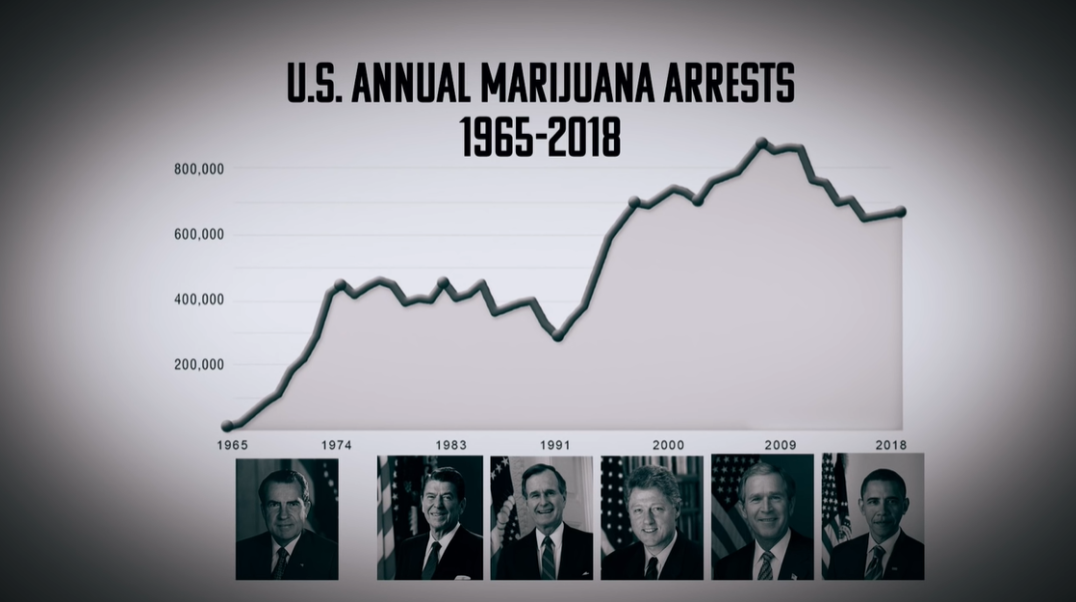Under Joe Biden’s presidency, experts anticipate a change in the federal cannabis policy. However, there are still approximately 40,000 people incarcerated for cannabis offences in the US – most of them are African Americans. Why is that?
As American states have the right to decide on their own cannabis policy, US citizens are treated differently depending on where in the country they live.
For example, if a successful cannabis business owner drives from California to Idaho to sell their products, they’d instantly become drug dealers.
Essentially, what is acceptable in some parts of the country could be punishable by years in prison in another corner.
While Vice President-elect Kamala Harris pledged to decriminalise cannabis possession and use during the presidential campaign, those already behind bars would not be freed. In other words, their conviction would not be expunged.
Bet’s documentary, SMOKE: The Rise Of Cannabis & Its Integration In Hip Hop Culture, has shown what’s wrong with the US system when it comes to dealing with cannabis.
As long as the federal policy doesn’t change, they argue, African Americans have every right to be afraid of being incarcerated for minor cannabis offences. However, cannabis and the parts of the African American culture have a strong bond and a long history.
Music
Cannabis had a somewhat huge influence on several genres, such as jazz, rap, and hip-hop, in the 20th century.
While cannabis had been taboo until the end of the 70s, the drug is associated with assisting in creating some of the most popular songs in that era.
NAS, the 15-time Grammy-nominated American rapper, said in the documentary that cannabis had been in his life since his childhood. He said his father had been a jazz musician who used cannabis to relax and create music.
NAS added: “Music and cannabis go together really well. They were born for each other. Music is to be listened to, you take it in, absorb it; cannabis, you inhale it, absorb it and that’s a vibe that goes with it.”
Not everyone was a fan of the drug, though. The majority of the public was against the drug. For instance, Cypress Hill was banned for life from Saturday Night Live when one of the members started smoking cannabis on live television.
At some point, however, the argument changed. The drug became a real thing among people in the music industry, and some of them started to sing or rap about cannabis.
Rick James – Mary Jane
Keith Murray, a journalist, told SMOKE: “In the 70s, cannabis was connected to black people in inner cities, the remnants of the hippies and the freaks.
“If you were to use cannabis in the 70s, you were kind of deemed as counter-culture. But something happened at the end of the 70s, something pivotal. The whole stoner culture took over when Cheech & Chong released the movie ‘Up in Smoke.’
In the 90s, they say in the movie, rappers such as Snoop Dogg, Dr Dre or Ice Cube, were very loud about cannabis use.
B-Real, one of the former lead rappers for Cypress Hill, said: “Growing up and being a creative person, cannabis came into my life before I even started making music.
“Cheech and Chong had nothing to do with hip hop but everybody in the hip hop industry referenced Cheech and Chong.
“They were so relevant in the hip hop community you almost had to reference them if you were talking about cannabis.”
War on weed
In American politics, one of the main topics during the second half of the 20th century was drug policy – more precisely, how to control drug use.
The mainstream media with those famous, anti-cannabis television ads and movies, was helping politicians to continue a long practice of bashing cannabis users.
Keith Murray said: “People were afraid of the drug. In movies they were talking about if you smoke weed, you’re going to be crazy – you’re going to kill yourself and your family.”
Regardless of the history of cannabis and hemp in the country, from Richard Nixon and Ronald Reagan to even Barack Obama, American presidents were very tough on cannabis users.

Source: SMOKE
Carl Hart, PhD, Professor at Columbia University, said: “Hemp has been here forever, the constitution was written on hemp paper as well.
“It became illegal when in part because of the actions of Harry Anslinger (Commissioner, Federal Bureau of Narcotics). The people associated with cannabis use were Mexican Americans, African Americans.”
He added the narrative was very simple: cannabis is what makes those women sleep with African Americans and foreigners.
The attitude regarding cannabis use and possession hasn’t changed significantly over the last four decades. Shockingly enough, depending on the state, a cannabis conviction could lead to the loss of parental rights, school loans, public house assistance and the right to vote.
Kamala Harris, VP-elect of the United States, told SMOKE: “The war on drugs incarcerated people I grew up with; people I know, people I care about. The War on Drugs criminalised the community I grew up in, and it was an abject failure.
“All of a sudden, in states like California, cannabis is legal, and there are people making a whole lot of money off of this. Meanwhile, there are other people sitting in prison for the same activity, which is selling cannabis.”
According to a senator talking in the movie, a black person is almost four times more likely to be incarcerated for a minor cannabis offence than a white person, despite similar rates of usage.
The future Biden-Harris administration has made people hopeful for a change for the better.
However, while African American business-owners can be raided in states where cannabis is legal; and while people could be sentenced to life in prison for cannabis possession, the leaders of the United States have a lot of work to do.

